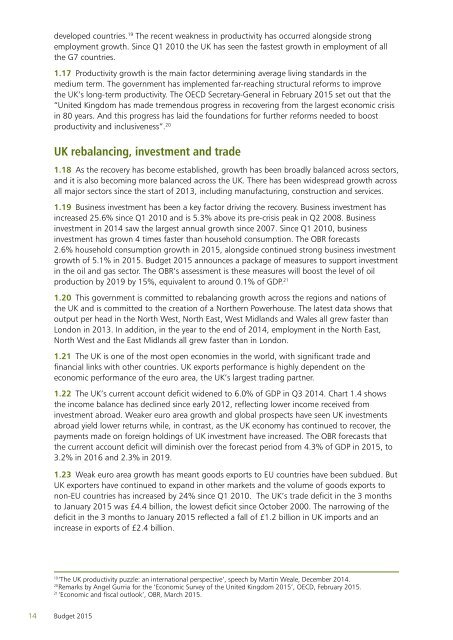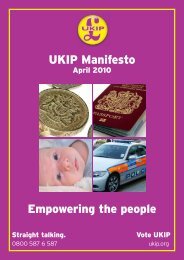Create successful ePaper yourself
Turn your PDF publications into a flip-book with our unique Google optimized e-Paper software.
developed countries. 19 The recent weakness in productivity has occurred alongside strong<br />
employment growth. Since Q1 2010 the UK has seen the fastest growth in employment of all<br />
the G7 countries.<br />
1.17 Productivity growth is the main factor determining average living standards in the<br />
medium term. The government has implemented far-reaching structural reforms to improve<br />
the UK’s long-term productivity. The OECD Secretary-General in February 2015 set out that the<br />
“United Kingdom has made tremendous progress in recovering from the largest economic crisis<br />
in 80 years. And this progress has laid the foundations for further reforms needed to boost<br />
productivity and inclusiveness”. 20<br />
UK rebalancing, investment and trade<br />
1.18 As the recovery has become established, growth has been broadly balanced across sectors,<br />
and it is also becoming more balanced across the UK. There has been widespread growth across<br />
all major sectors since the start of 2013, including manufacturing, construction and services.<br />
1.19 Business investment has been a key factor driving the recovery. Business investment has<br />
increased 25.6% since Q1 2010 and is 5.3% above its pre-crisis peak in Q2 2008. Business<br />
investment in 2014 saw the largest annual growth since 2007. Since Q1 2010, business<br />
investment has grown 4 times faster than household consumption. The OBR forecasts<br />
2.6% household consumption growth in 2015, alongside continued strong business investment<br />
growth of 5.1% in 2015. Budget 2015 announces a package of measures to support investment<br />
in the oil and gas sector. The OBR’s assessment is these measures will boost the level of oil<br />
production by 2019 by 15%, equivalent to around 0.1% of GDP. 21<br />
1.20 This government is committed to rebalancing growth across the regions and nations of<br />
the UK and is committed to the creation of a Northern Powerhouse. The latest data shows that<br />
output per head in the North West, North East, West Midlands and Wales all grew faster than<br />
London in 2013. In addition, in the year to the end of 2014, employment in the North East,<br />
North West and the East Midlands all grew faster than in London.<br />
1.21 The UK is one of the most open economies in the world, with significant trade and<br />
financial links with other countries. UK exports performance is highly dependent on the<br />
economic performance of the euro area, the UK’s largest trading partner.<br />
1.22 The UK’s current account deficit widened to 6.0% of GDP in Q3 2014. Chart 1.4 shows<br />
the income balance has declined since early 2012, reflecting lower income received from<br />
investment abroad. Weaker euro area growth and global prospects have seen UK investments<br />
abroad yield lower returns while, in contrast, as the UK economy has continued to recover, the<br />
payments made on foreign holdings of UK investment have increased. The OBR forecasts that<br />
the current account deficit will diminish over the forecast period from 4.3% of GDP in 2015, to<br />
3.2% in 2016 and 2.3% in 2019.<br />
1.23 Weak euro area growth has meant goods exports to EU countries have been subdued. But<br />
UK exporters have continued to expand in other markets and the volume of goods exports to<br />
non-EU countries has increased by 24% since Q1 2010. The UK’s trade deficit in the 3 months<br />
to January 2015 was £4.4 billion, the lowest deficit since October 2000. The narrowing of the<br />
deficit in the 3 months to January 2015 reflected a fall of £1.2 billion in UK imports and an<br />
increase in exports of £2.4 billion.<br />
19<br />
‘The UK productivity puzzle: an international perspective’, speech by Martin Weale, December 2014.<br />
20<br />
Remarks by Angel Gurria for the ‘Economic Survey of the United Kingdom 2015’, OECD, February 2015.<br />
21<br />
‘Economic and fiscal outlook’, OBR, March 2015.<br />
14 Budget 2015



